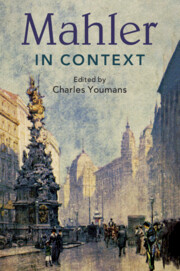Book contents
- Mahler in Context
- Composers in Context
- Mahler in Context
- Copyright page
- Dedication
- Contents
- Figures
- Music Examples
- Notes on Contributors
- Preface and Acknowledgments
- Abbreviations
- Part I Formation
- Part II Performance
- Chapter 8 Operatic and Orchestral Repertoire
- Chapter 9 Collaborators
- Chapter 10 A Perfect Storm
- Chapter 11 Celebrity
- Part III Creation
- Part IV Mind, Body, Spirit
- Part V Influence
- Further Reading
- Index
Chapter 10 - A Perfect Storm
Mahler’s New York
from Part II - Performance
Published online by Cambridge University Press: 18 December 2020
- Mahler in Context
- Composers in Context
- Mahler in Context
- Copyright page
- Dedication
- Contents
- Figures
- Music Examples
- Notes on Contributors
- Preface and Acknowledgments
- Abbreviations
- Part I Formation
- Part II Performance
- Chapter 8 Operatic and Orchestral Repertoire
- Chapter 9 Collaborators
- Chapter 10 A Perfect Storm
- Chapter 11 Celebrity
- Part III Creation
- Part IV Mind, Body, Spirit
- Part V Influence
- Further Reading
- Index
Summary
The New York City that Mahler encountered in 1907 had for decades been one of the music capitals of the world. In the late nineteenth century, two towering personalities, Anton Seidl and Antonin Dvořák, had shaped the city’s symphonic and operatic affairs – and memories of these men, and of their accomplishments, would cast deep shadows on Mahler’s lesser New World achievements. This chapter elaborates on these influences, as well as considering the role of newspaper critics (principally Henry Krehbiel) and impresarios (at both the Metropolitan Opera and the New York Philharmonic) in shaping the musical culture in which Mahler tried to make new start after leaving Vienna. Because he failed to discern the burden of expectation imposed on him by the legacies of Seidl and Dvořák, and because his self-absorption prevented him from recognizing the political challenges he faced, Mahler would remain a chronic outsider.
- Type
- Chapter
- Information
- Mahler in Context , pp. 81 - 90Publisher: Cambridge University PressPrint publication year: 2020

